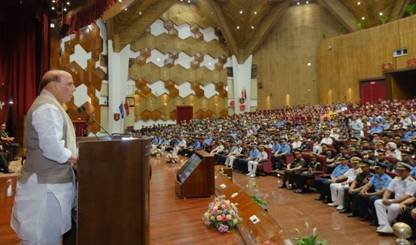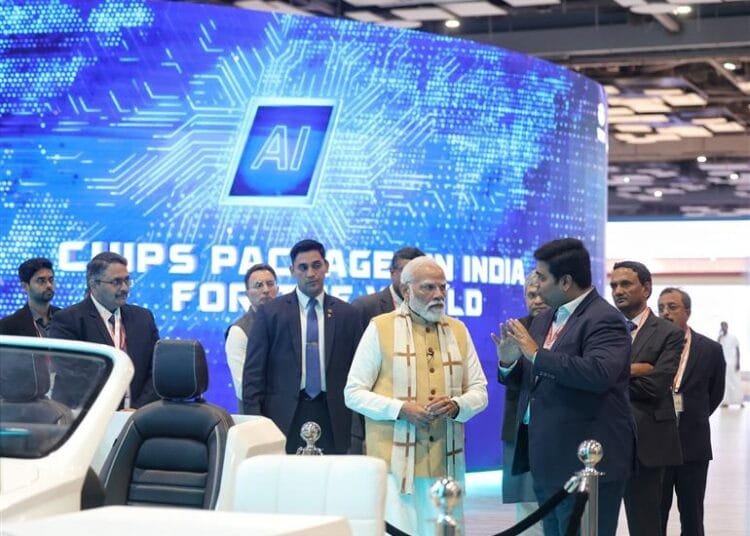Minister pitches for development-modernisation of Armed Forces
Armed Forces must operate jointly and remain future-ready in today’s ever-evolving multi-domain environment where cyber, space and information warfare among others are as potent as conventional operations, Defence Minister Rajnath Singh said during the Convocation Ceremony of the 80th Staff Course of Defence Services Staff College (DSSC), Wellington, Tamil Nadu on 10 April 2025 http://mod.gov.in.
Addressing the Armed Forces officers of India and friendly countries, he pointed out that today’s global geopolitics is being redefined by three key metrics: a major pivot towards prioritising national security, a technological tsunami sweeping the global landscape, and accelerating innovation.
The Minister urged the officers to study the nuances of these trends in-depth to stay ahead on strategic-military change curve, adding that the Government is leaving no stone unturned to transform the Armed Forces into a technologically-advanced combat-ready force capable of multi-domain integrated operations https://www.meity.gov.in/.
Highlighting that Artificial Intelligence and other emerging technologies are revolutionising deterrence and war-fighting in critical ways, Rajnath Singh termed the power of technological innovation in combat theatres as breathtaking http://openai.com.
“In the Ukraine-Russia conflict, drones have virtually emerged as a new arm, if not a transformative science. The majority of losses of soldiers and equipment have been attributed neither to traditional artillery nor to armour but to drones,” he noted.
“Similarly, space capacities in the Low Earth Orbit are transforming military intelligence, persistent surveillance, positioning, targeting and communications, thus taking combat to a new high,” he said https://digitalinasia.com/.
The Minister stressed that the world is in the age of Grey Zone and Hybrid warfare where cyber-attacks, disinformation campaigns, and economic warfare have become tools that can achieve politico-military aims without a single shot being fired.
He added that India faces persistent threats along its borders, which are further compounded by the challenge of proxy war and terrorism emanating from its neighbourhood.
Rajnath Singh also spoke of the impact of the conflict in West Asia and the geopolitical tensions in the Indo-Pacific on the overall security calculus, in addition to non-traditional security threats such as natural disasters and climate change.
He stressed on the need to vigorously pursue the transformation of the Armed Forces to remain capable and relevant for future wars.
Rajnath Singh pitched for the development and modernisation of the Armed Forces through self-reliance.
“Lessons of the ongoing conflicts teach us that building a resilient, indigenous, and future-ready defence technological & manufacturing ecosystem is not an option, but a strategic necessity. There is a need to develop low-cost high-tech solutions and enhance the fighting capability of the Armed Forces. Our forces must not only keep pace with technological changes, but also lead it,” he said.
Rajnath Singh also batted for enhanced synergy among all components to ensure national security. Fostering a ‘Whole of Nation’ approach while undertaking actions in the entire spectrum of diplomatic, informational, military, economic and technological domains is key to ensuring success in this endeavour, he said.
He added that achieving a better future and prosperity for the nations will always remain a collective pursuit.
“Increasing connectivities and dependencies among countries and people implies that the multitude of challenges are better faced together than individually. Mutual interests and synergies will help us achieve our goal at sub regional, regional and even global levels,” he said.
Rajnath Singh exhorted the officers to focus on five ‘A’s – Awareness, Ability, Adaptability, Agility and Ambassadors – to tackle future challenges.
“As warfighters and protectors of national security, you need to remain aware of the environment and its implications. You must acquire the ability and skill set required by future leaders. You must imbibe adaptability and agility as key virtues,” he underlined.
“The battlefield of tomorrow will require leaders who can adapt to unforeseen circumstances, leverage technology to their advantage and come out with innovative solutions. You must become Ambassadors of your respective Armed Forces. Be an ambassador of change and the perfect role model amongst the society at large,” he stressed.
The 80th Staff Course comprises 479 student officers, including 38 personnel from 26 friendly countries. Three women officers are also participating in the course.
Established in 1948, DSSC is a premier Tri-service training institution that imparts professional education to select middle-level officers of the Indian Armed Forces and friendly countries. It aims to enhance their professional competencies for assuming higher responsibilities. Over the years, more than 19,000 Indian officers and 2,000 international officers have graduated from DSSC, many of whom have risen to become heads of states and military forces worldwide. Fiinews.com










